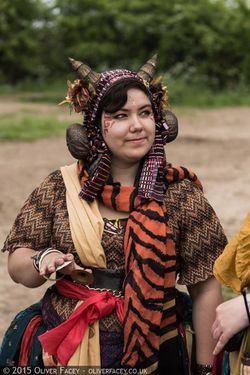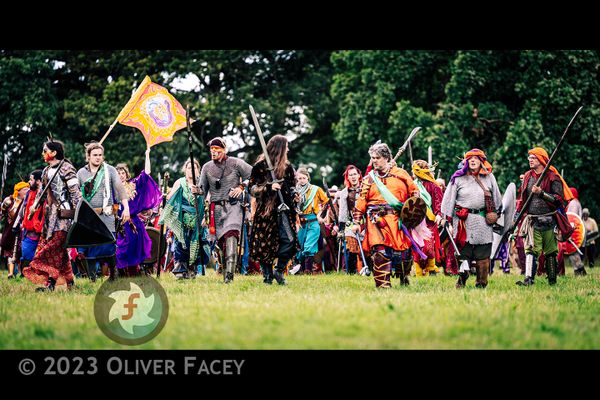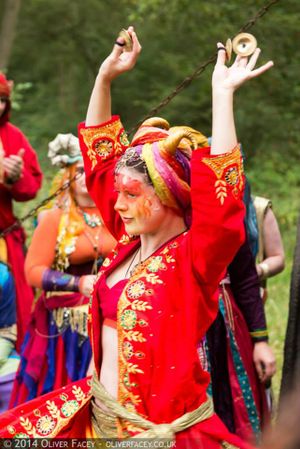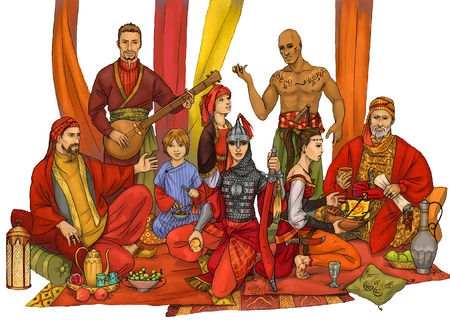The Brass Coast people
Overview
The people of the Brass Coast are divided into three great tribes descended from the families of the three founders, named the Erigo, the Riqueza and the Guerra. Freeborn citizens choose which founder best fits their character and ideals, joining the tribe named for that founder accordingly. Each tribe is composed of a great number of extended families. The smallest families have only a few dozen members, the largest can have hundreds or thousands of people sharing a family name and a common purpose.
The archetypal Freeborn is forthright, honest about their actions, and unashamed of their motives. The Freeborn do not feel they owe the world anything, but neither do they feel the world owes them. They can be charitable, but only when they choose; they can be selfish, but never with their family. They are direct, notoriously frank and gloriously unabashed.
The Freeborn give freely to family and expect the same in return. But with everyone else they would rather define a debt and know what is owed and to whom, instead of being left with an undefined obligation. They detest unspecified favours and obligations, even between friends or lovers, because there is no certainty to what is owed. An honest interaction is one where people know what they are offering, what they are getting and what it will cost them.
To the Freeborn, all things can have a price. Most Freeborn do not earn their living as a merchant, but almost all seek out opportunities to turn a profit. Even in social situations, they are comfortable seeing their interactions with others in monetary terms. Freeborn hosts are not insulted by a guests' offer to pay for a meal, nor by a request to purchase an ancient family heirloom. They are no greedier than other people -- there are plenty of things they wouldn't contemplate selling -- but they won't be angry at you for asking, provided you accept their refusal.
The Freeborn are notoriously candid. Transactions that in other nations would be conducted discreetly in private are carried out openly on the Brass Coast without shame. They are perfectly comfortable with someone paying to influence a political decision, but they expect those making the decision to be unabashed of their actions. The Freeborn are fully aware that other nations do not share their values. They don't expect frankness from other nations but they don't allow others to impose their values on them.
The Freeborn are passionate people who love dancing, story-telling and performance. The best dances are energetic and exuberant, and those who aren’t dancing are encouraged to join in by making music to cheer the dancers on. The best stories are bold, often bawdy and are delivered as a performance designed to involve and energise the audience. It is considered rude to boast; telling the tales of your own deeds is vulgar and if it must be done, events should always be described as if they happened to a friend. To tell the tale of another’s deeds does them great honour. The Freeborn love to include the earthy parts of a story, but are always clear when they are embellishing the tale, for instance, "I don't know what happened next, but I like to imagine it was like this..." The art of a Freeborn story-teller is to make even the most mundane tale become engaging or hilarious by the delivery. They particularly like to include their audience, getting them to act out the parts described or cheer and sing along at appropriate moments.
Archetypes
| Brass Coast Archetypes | |
|---|---|
| Corsair | Kohan |
| Dhomiro | Scriviner |
| Hakima | Sutannir |
There are magicians, priests, warriors, and traders of every stripe in every nation in the Empire. An archetype represents a specific attitude or approach to a given role that reflects cultural values and common ambitions of a nation. Choosing an archetype helps to define your character; it provides roleplaying hooks and ready-made character goals, but it also places demands on your character in terms of how you portray them. Selecting an archetype is optional, and it's better not to pick one if none of them appeal to you.
The Freeborn are not the strongest military in the Empire, but there is one area where their strength is uncontested – on the open seas. Entire families make their living as corsairs, sea-borne raiders who prey on barbarian shipping passing through the Bay of Catazar. The Freeborn detest piracy, but they regard privateering as a perfectly legitimate form of warfare, which has the added advantage of also being highly profitable! Corsairs are not just privateers, and many routinely engage in foreign trade. In some parts of the Brass Coast there is a common saying which suggests that the only real difference between a privateer and a merchant is that the privateers get their goods cheaper.
By tradition, each Freeborn family is represented by a dhomiro, whose role it is to represent their interests to those who seek to deal with the family as a whole. Most families simply select the most suitable individual to take the role, picking the person with the best ability to organise or communicate. They tend to have great influence, but little formal power; they certainly don't rule over their family members. Any dhomiro that put on airs or graces would be ridiculed and dhomiro that are not effective in furthering their family's interests are quickly replaced.
The more powerful and organised magicians in Freeborn society are the hakima. These politically active covens view other Freeborn magicians as unsophisticated dabblers at best, and ignorant meddlers at worst. The hakima are highly skilled practitioners of ritual magic and custodians of magical lore handed down to them by Erigo, Guerra, and Riqueza. They are dedicated to preserving the integrity of the nation as a whole and regularly look to recruit competent ritual magicians from the tribes into their own circles. The hakima are traditionally held to be wise, able to perceive the larger picture more effectively than most Freeborn who are anchored in more mundane activities. They may be consulted when important decisions need to be made within a family, or when magical assistance is sought. They rarely wait to be consulted, however – a hakima is likely to be poking around any important business ready to offer a suggestion as to what to do next.
Centuries ago, the hakima began to gather Freeborn who had been disowned and turned them into a fighting force called kohan, a name that means without family. By serving their tribe the Freeborn were able to find a way to redeem themselves, or create a new place for themselves in society. Although they still accept those who have been cast out, today most kohan are volunteers, individuals who find such joy in battle that they cannot give it up. They fight for the joy of battle, flinging themselves into combat with a blood-thirsty relish that can easily dispirit an enemy. Kohan often adopt flamboyant costume and grotesque body paint, the better to unnerve their enemies. When they are not fighting they are usually found celebrating their continued survival with that same intensity.
When it comes to making financial agreements more complex than a direct exchange of goods, Freeborn are most comfortable dealing through contracts. As a consequence, Freeborn merchants usually seek out the services of a professional scrivener to formalise their agreements. A discreet, neutral scrivener can work out and witness a contract that satisfies both parties, and they are very much in demand. Combining the skill to express ideas simply and clearly in writing with a talent for arbitrating between individuals to help them express what they actually want, these scriveners are the backbone of Freeborn economic life.
Freeborn religious ceremonies tend to place their emphasis on celebration rather than sermons. Many families include a devout priest or spiritual family member who can be relied on to oversee these indulgences, but for the largest and most important festivities the Freeborn seek out the services of a sutannir. A cross between a professional priest and a party organiser, sutannir conduct important ceremonies such as the coming of age or a wedding, and see to the spiritual needs of the Freeborn as a whole. They are known for painting their skin with stylised flames in bright colours, and dressing in flamboyant costumes. They embrace the idea of embodying virtue - that their audiences prefer to be inspired to virtue rather than lectured.
Names
Freeborn names are primarily Spanish/Mexican in flavour, with Moorish influence.
Freeborn typically have three names. The first is their given name as decided by their parents and can be as creative or as bland as their imagination. The second is their family name and the last name is that of the tribe - one of the Erigo, the Riqueza or the Guerra.
Freeborn names follow the pattern “firstname” i “family” i “tribe”. Hakima and kohan often drop the family name and use just their tribal name.
Children do not have a tribe name until they pass their Test of Citizenship. Their family name is generally that of their parents. Where the parents have different family names, the relationship contract commonly stipulates which family name offspring will take. The child chooses their tribe after they complete their test - often with guidance from a hakima or the egregore. This is usually seen as an excuse for a family celebration.
A very few Freeborn - specifically those evacuated from the Isle of Zemress - append "i Zemress" to the end of their family name, giving them four names.
Sample names
- Ahraz i Contero i Riqueza
- Iñes i Guerra (for a hakima or kohan of the Guerra tribe)
- Edina i Ezmara i Zemress i Erigo (for a Zemress islander of the Erigo tribe)
N.B. Whilst some names are inspired by real-world names which may be given to specific genders, Empire is a gender blind setting and people of any gender choose any name they like that is appropriate to their nation.
Naming resources
Further Reading
Core Brief
Additional Information



